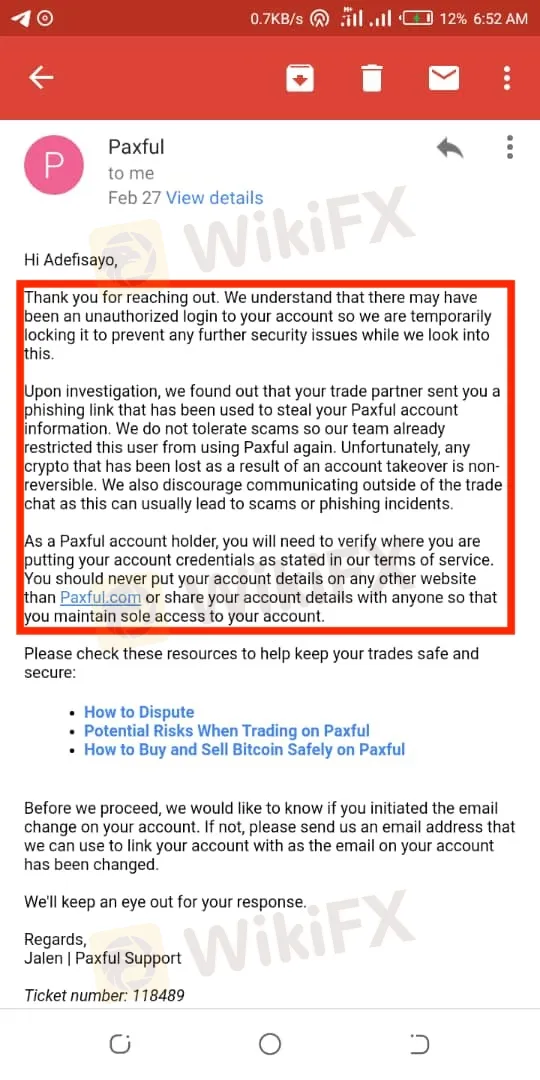简体中文
繁體中文
English
Pусский
日本語
ภาษาไทย
Tiếng Việt
Bahasa Indonesia
Español
हिन्दी
Filippiiniläinen
Français
Deutsch
Português
Türkçe
한국어
العربية
Beware! Scammer Targeting Users of Paxful Financials!
Abstract:In the dynamic landscape of digital finance, a recent incident within Paxful Financials sheds light on the risks faced by users, as Adefisayo's encounter with fraudulent activity underscores the importance of vigilance and caution in navigating cryptocurrency platforms.

In the realm of digital finance, instances of deception and monetary loss unfortunately often emerge, leaving victims to grapple with the aftermath of trust betrayed. One such incident has arisen within Paxful Financials, where a user, Adefisayo, encountered a troubling ordeal involving a merchant known as SubskbotuqZ. Adefisayo, like many others drawn to the allure of digital transactions and financial autonomy, navigated onto Paxful Financials (Paxful). However, their journey took an unexpected turn upon encountering SubskbotuqZ. Under the guise of legitimate transactions, SubskbotuqZ managed to swindle Adefisayo out of a significant sum, accessing their account without authorization through a phishing link and resulting in a loss of $65.45 in Neteller funds.

Promptly recognizing the fraudulent nature of the transaction, Adefisayo sought recourse through Paxful's official channels, anticipating a swift resolution and the recovery of their lost funds. However, instead of finding solace in the platform's purported safeguards, Adefisayo was met with disappointment. Paxful's response, rather than offering tangible assistance in recovering the lost funds, merely involved the removal of the offending merchant from the platform.

This unfortunate sequence of events serves as a poignant reminder to all participants in the digital finance sphere of the inherent risks associated with such endeavours. Despite promises of security measures and regulatory oversight, instances of deceit and financial loss persist, leaving victims stranded in the wake of deception.

Established by a team of developers, Paxful operates as a peer-to-peer exchange platform aimed at simplifying access to Bitcoin. Facilitating direct exchanges, the platform enables buyers and sellers of cryptocurrencies to connect and conduct transactions directly. Transactions on Paxful typically entail buyers depositing cash through various payment methods supported by the platform, such as prepaid VISA, Gift Card Code, or Western Union, into the seller's account. Upon confirmation of receipt of funds from Paxful's escrow service, sellers release Bitcoins directly to the buyers. Notably, Paxful stands out from centralized exchanges due to its streamlined access - users are not required to create a username or password to access the marketplace; only their email address is necessary. For individuals residing in regions where centralized cryptocurrency exchanges are inaccessible or prohibited, Paxful emerges as a viable solution. Its accessibility from any location with internet connectivity positions it as a convenient option for users seeking alternative avenues for cryptocurrency transactions. However, notwithstanding Paxful's ambitious claims, it's essential to note that the platform is not regulated according to WikiFX's findings. With a low WikiScore of 1.36 out of 10, Paxful is deemed a highly risky broker to engage with.
WikiFX emphasizes the importance of opting for regulated brokers with a WikiScore of 7.0 or above to safeguard capital and trading experiences effectively.

Disclaimer:
The views in this article only represent the author's personal views, and do not constitute investment advice on this platform. This platform does not guarantee the accuracy, completeness and timeliness of the information in the article, and will not be liable for any loss caused by the use of or reliance on the information in the article.
Read more

Bitpanda Secures Full Broker-Dealer License in Dubai
Bitpanda has officially obtained a full broker-dealer license from the Dubai Virtual Assets Regulatory Authority (VARA), marking a significant milestone in its international expansion. This approval, which follows preliminary authorization granted three months earlier, enables the European digital asset exchange to introduce its comprehensive suite of virtual asset services to investors in the United Arab Emirates (UAE).

Interactive Brokers Expands Crypto Trading with Solana, XRP, Cardano, and Dogecoin
Interactive Brokers adds Solana, XRP, Cardano, and Dogecoin to its platform, enabling U.S. and U.K. clients to trade crypto 24/7 with low fees.

Gold Surges to New Highs – Is It Time to Buy?
Recently, gold prices have once again set new records, surpassing $3,077 per ounce and continuing a four-week winning streak. Is It the Right Time to Invest?

Why Does the Yen's Exchange Rate Fluctuate Repeatedly?
JPY Exchange Rate Fluctuations: How Should Investors Respond?
WikiFX Broker
Latest News
Enlighten Securities Penalized $5 Million as SFC Uncovers Risk Control Failures
Why Are Financial Firms Adopting Stablecoins to Enhance Services and Stability?
Experienced Forex Traders Usually Do This Before Making a Lot of Money
Octa vs XM:Face-Off: A Detailed Comparison
When High Returns Go Wrong: How a Finance Manager Lost RM364,000
Bridging Trust, Exploring Best—WikiEXPO Hong Kong 2025 Wraps Up Spectacularly
Fidelity Investments Explores Stablecoin Innovation in Digital Assets Sector
Interactive Brokers Expands Crypto Trading with Solana, XRP, Cardano, and Dogecoin
SEC Ends Crypto.com Probe, No Action Taken by Regulator
Why More People Are Trading Online Today?
Currency Calculator







